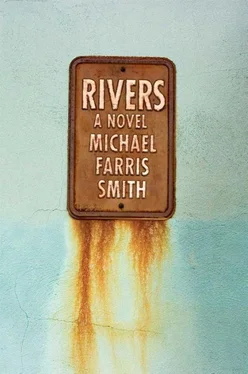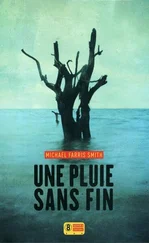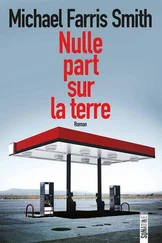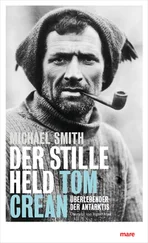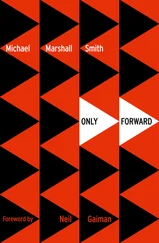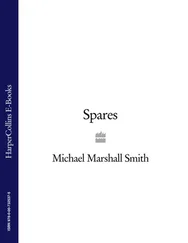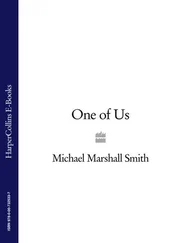And then how they nailed him up and laughed at him.
They moved off the road and onto the highway and he thought about those stories and he thought about that woman in the burgundy dress and he thought about the place they had just left where they had taken what didn’t belong to them. He thought about the man who had written the note and why he had chosen the words that he had chosen. He looked out across the sky, imagined it clear and blue, and imagined the words from the note written in large, looping trails of white.
To whom it may concern—he is not dead he is risen.
BY THE TIME THEY MADE it to the church, he was slumped forward on habana with his pillowcase of all his possessions dragging the ground and his head resting against her mane. He all but fell off and went down to his knees and the dog licked at his forehead. He reached up and brushed the dog’s head and then got to his feet and walked inside the church, dragging the pillowcase along. Night was closing in and the stiff rain had returned and he sat down on the back pew where he had spent the night before. He found a bottle of water and the aspirin and he took a few more and then he opened a can of Vienna sausages, trying to figure out if it was starve a fever, feed a cold, or feed a fever, starve a cold. Either way, he ate half of the thumb-sized sausages and gave the other half to the dog and he tossed the can on the floor. Habana clip-clopped into the church foyer.
Lie down and sleep, his body told him.
Get up and go find them, his mind replied. Find them. The ones who took your Jeep and invaded your home and took the pieces of Elisa that you had left. Find them and give it twice as bad as you took it. Forget the fever and the soreness and the weakness and get up and go. If they’re not gone already, they will be, and you don’t have long.
Lie down and sleep, his body said again, and he stretched out across the pew.
Just for a minute.
He closed his eyes. The dog pushed the empty can around the floor as it fought for every last taste of food. Habana shuffled, clopping and splashing.
So hot, he thought. So hot so fast. He remembered a fever as something balmy and creeping that eased you gently into bed and let you lie there and watch for a few days until it was gone. Not this sharp, stinging thing that was on him now, burning him in the cold air.
Get up. You don’t have time. Get up.
Only a minute, he thought, and he felt himself beginning to go. Still and drifting. Behind his eyes there appeared strange images of life before that seem to roam in the vast caverns of the mind when it perches on the cliffside of unconsciousness. A barrage of images that stretched from life before the storms, through the devastation, and up to the last days of his life. Faces of those he barely remembered and odd remembrances of grocery lists or the scores of games and the voices of those who had hurt him and then it all left him and there was only black and he was asleep with twitching eyelids.
HE AWOKE HOURS LATER. HE sat up and rubbed himself and shivered. In the pillowcase he found the flashlight and he shined it around. The dog was curled on the end of the pew and he didn’t see Habana. The wind blew through the church and there was a rustling in the dead leaves and limbs of the tree lying across the pulpit and a raccoon crawled along the trunk, stopped and looked at him, then climbed on down and out of the church.
Cohen went outside and shined the light around and Habana was in the field across the road and he called out to her. She saw him and began walking back as he looked around for anything dry enough to burn. Inside the church he filled his arms with small branches scattered about, but anything big enough to last was too wet and mushy. He climbed onto the fallen tree and broke off limbs and dropped them into a pile in the choir loft below. Then he climbed down into the choir loft and took a couple of the straight-back chairs and in the aisle of the church he piled it all together and it seemed like enough to make it through the night. Or at least until he could get a few hours’ sleep because tomorrow there could be no more rest. He felt guilty for wasting the afternoon but it had helped him recover some and he knew he had to be ready for a fight.
He started the fire on the concrete slab outside the front doors. The smoke climbed and hovered in the ceiling of the porch and then drifted out into the night. He sat in one of the chairs while the other one burned and he drank water and ate aspirin. Habana’s saddle and bridle were on the offering table and the dog lay on the concrete next to him on a purple choir robe that he had found in a back room. The rain was steady and almost stopped once or twice.
He talked to the dog.
“The first one was white. Old as dirt but slow and careful like you like the first one to be. Don’t want a bronco to sit your kid up on. Didn’t even know we were getting him. Dad pulled up with the trailer, honked the horn. Me and Mom came out and he called me over. Said look at this. We walked to the trailer and her snout was sticking out and he said about time you got up on a horse. Her name was Snowball, I think. Real original.”
He drank a little water. The dog stood, walked in a circle, lay back down. Cohen rubbed at his beard. Thought some.
“First car was a VW. Little two-door something. Four gears. Couldn’t tear the son of a bitch up. I used to see how fast I could go in third gear. Seventy-two was the record. Damn thing sounded like it was about to blow any second. Crashed it. Or got hit. Or something. It folded up like tinfoil. Me and Elisa went on our first date in that car. Tenth grade. Valentine’s dance in that smelly old gym. It coulda been at the prince’s palace, though, ’cause I was out of my mind, I was so nervous. I mean nervous like wet hands and armpits and nearly-tripping-and-falling-down nervous.”
The dog laid its head down. Whined some.
“She wore a yellow dress. Everybody else had on red or pink. She wore yellow.”
He stopped talking and stared out into the night. It seemed as if his words were floating out there somewhere and if he looked closely enough he could see the pictures they described.
He leaned back in the chair and stretched out his legs. The rain had eased and somewhere out to the side of the church a tree branch cracked and fell. He looked back at the dog. “I don’t know,” he said.
Cohen had always talked to the dog. It had appeared one day. Just like Habana, and he had never bothered to name it because he knew it already had a name. He fed it once and that was all it took to make them friends and he talked to the dog in the way that one might talk to a child or a stranger on a train. Stating the obvious. Asking questions he already knew the answer to. His voice amicable and safe.
The dog rolled over and Habana walked around the side of the church. Cohen watched her and it was then that he saw the orange eyes back off in the trees behind the building. Two large orange eyes caught in the light of the fire, perfectly still in the dark. Habana kept on walking until she was around in front of them but Cohen didn’t move and stayed fixed on those eyes as he knew they were the eyes of something that mattered. The dog, seeming to sense his unease, sat up and looked out to where he was looking and began to growl a low, cautious growl. “Shhhhh,” Cohen whispered. The dog continued on and he reached down and rubbed its head and whispered for it to be quiet. Be quiet. Don’t move.
He slowly moved his hand to his belt and gripped the knife. “Sit down,” he told the dog but the dog stood stiff and its growl had turned into a tempered whine. “It’s okay,” he whispered. “But do not move.”
Habana walked closer to them and snorted and that scared the dog, which tucked itself behind Cohen’s chair.
Читать дальше
